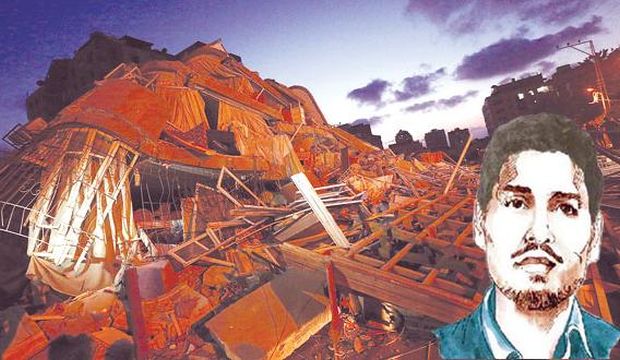
This August 20, 2014 file photo shows rubble from the presumed home of the leader of Hamas’s Al-Qassam Brigades, Mohammed Deif, in the Sheikh Radwan district in Gaza, with an artist’s impression (Bottom-R) of Deif’s possible appearance now. (Asharq Al-Awsat)
Ramallah,Asharq Al-Awsat—After five failed attempts on his life, the military commander of Hamas’s Al-Qassam Brigades, Mohammed Deif—known as “Abu Khaled”—has become a legendary figure in the eyes of fellow Palestinians, who see in him the de facto minister of defense—though he is unlikely to ever have the chance to officially assume the position.
Deif has been pronounced dead twice by Israel, which still insists that his fate remains unknown following the recent attempt on his life on August 20. In a statement following the attack, Hamas claimed that Deif was still alive. However, Palestinians are still waiting for him to make a public appearance, as was his habit in the wake of previous assassination attempts.
Deif, whose nom de guerre means “guest” in Arabic—on account of his not having a permanent residence—has not appeared in public for two years, and keeps information about his whereabouts, movements, and lifestyle extremely secret. Former acquaintances who spoke to Asharq Al-Awsat are certain they would not recognize him now if they met him today. Even Israel, which has been chasing him for years, does not have a recent photograph of him.
Deif, whose real name is Mohammed Diab Ibrahim Al-Masri, was born in 1965 in Khan Yunis, south of the West Bank, to an extremely poor family. As a teenager he had to leave school early to help at his father’s upholstery business, and would subsequently hold a string of temporary jobs, from taxi driver to an owner of a tiny hennery. He spent his childhood in one of Khan Yunis’s neighborhoods with his seven siblings and parents. His father, 81, has survived his mother, who died in 2011, aged 74.
Deif’s friends in the neighborhood say he was friendly and humorous, but introverted. He was introduced to Hamas at the end of 1987 through acquaintances he made during his visits to the local mosque. Eventually he managed to resume his studies and graduated from the Islamic University in Gaza in 1988 with a bachelor’s degree. During his university education, he was known for his passion for theater and played several historical roles, even establishing his own theater company, known as “The Returnees.” In terms of his personal life, he has married twice and fathered seven children.
In 1989 Deif was detained by Israel for 16 months without trial on charges of working for the military wing of Hamas. After his release, he was among those who established the Al-Qassam Brigades, and in the following decade oversaw and participated in countless operations against Israel.
His growing prominence within the organization quickly made him a target. In 1996, then-prime minister of Israel Shimon Peres requested former Palestinian president Yasser Arafat to arrest Deif as a condition of going ahead with the implementation of security and political agreements. But Arafat acted like it was the first time he had heard of Deif and asked his security aide Mohammed Dahlan about the man’s identity, angering the Israelis.
In May 2000, the Palestinian Authority arrested him on Israel’s request. After his release he became the commander of the Al-Qassam Brigades, succeeding Salah Shehadeh in 2002. Israeli intelligence credit Deif with turning the organization into an effective, organized, and highly dangerous force.
Today, Deif is as notorious in Israel as he is acclaimed among Palestinians. Israeli officials often describe him as the “serpent’s head,” and the Israeli media often refer to him as the Israeli government’s most wanted man.
The first assassination attempt came in 2001, which was followed by two more in 2002 and 2003. Three years later, in 2006, an Israeli rocket struck the apartment where he was holding a meeting with other senior members of the Brigades. Deif survived the attack, though Israel claims he suffered severe injuries that have left him with ongoing health problems.
Apart from three grainy videos in which he appeared discussing war on Israel, Deif has not made a public appearance over the past years. No one knows for certain even whether he attended his mother’s funeral in 2011. Sources close to Hamas told Asharq Al-Awsat the military commander was present but no one recognized him. According to other accounts, Deif made a brief visit to the funeral lasting no more than five minutes.
His caution—from his perspective—is entirely justified. On August 20, several missiles reportedly hit a house in the Sheikh Radwan neighborhood in Gaza, killing Deif’s wife Widad, 28, his son Ali, and daughter Sara. Israel announced that the attack had been an attempt to kill Deif, and issued a list of names of senior Qassam leaders it said Tel Aviv believed had been present, without giving confirmations about Deif’s death.
The secrecy Deif surrounds himself with even extends to members of his own extended family. His father-in-law Mustafa Asfour said he only met Deif once—when he proposed to his daughter Widad. He also said he did not have any information about the residence of his daughter due to the tight security that surrounds her husband.
Despite a truce between Israel and the Palestinian factions now being in place, Hamas—and Deif—will not disappear from Tel Aviv’s radar. Writing in Foreign Policy magazine this week, Israel’s hardline Foreign Minister Avigdor Lieberman called on Hamas to be disarmed before any talks between the two sides take place. It doesn’t take an expert on Palestinian politics to guess that this will not go down well in Gaza, and that—for the foreseeable future—Deif will remain a marked man, and will do his best to remain in the shadows.
